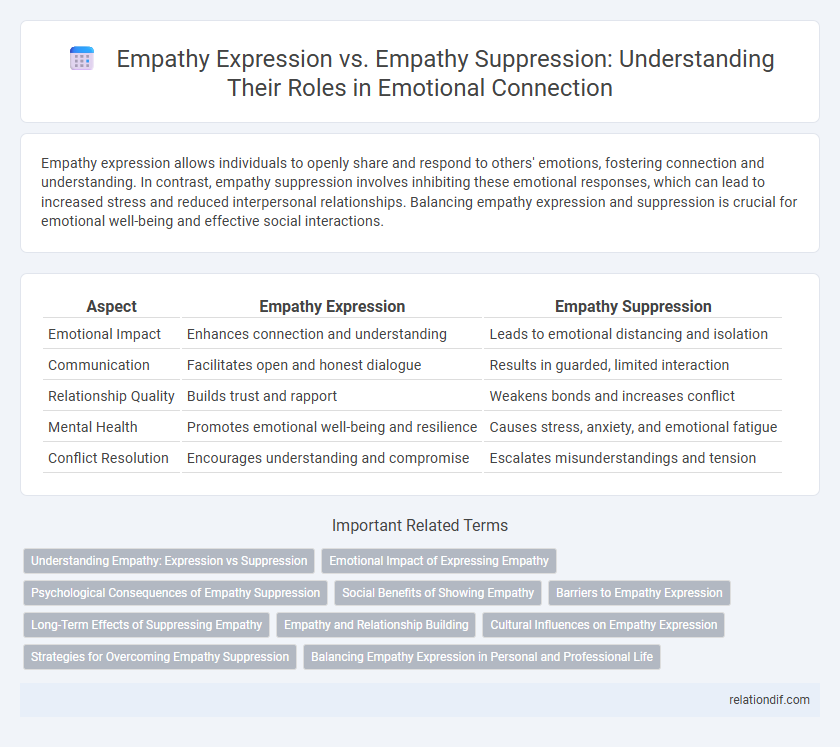Empathy expression allows individuals to openly share and respond to others' emotions, fostering connection and understanding. In contrast, empathy suppression involves inhibiting these emotional responses, which can lead to increased stress and reduced interpersonal relationships. Balancing empathy expression and suppression is crucial for emotional well-being and effective social interactions.
Table of Comparison
| Aspect | Empathy Expression | Empathy Suppression |
|---|---|---|
| Emotional Impact | Enhances connection and understanding | Leads to emotional distancing and isolation |
| Communication | Facilitates open and honest dialogue | Results in guarded, limited interaction |
| Relationship Quality | Builds trust and rapport | Weakens bonds and increases conflict |
| Mental Health | Promotes emotional well-being and resilience | Causes stress, anxiety, and emotional fatigue |
| Conflict Resolution | Encourages understanding and compromise | Escalates misunderstandings and tension |
Understanding Empathy: Expression vs Suppression
Understanding empathy involves recognizing the contrast between empathy expression, which fosters emotional connection and social bonding, and empathy suppression, which often leads to emotional distancing and reduced interpersonal trust. Expressing empathy activates mirror neurons, enhancing emotional resonance and promoting prosocial behavior, while suppressing empathy can hinder emotional awareness and contribute to increased stress and isolation. Effective management of empathy expression and suppression is vital for emotional intelligence and maintaining healthy relationships.
Emotional Impact of Expressing Empathy
Expressing empathy enhances emotional connection and fosters trust by validating others' feelings, which promotes psychological well-being and reduces stress. Suppressing empathy, conversely, can lead to emotional detachment and increased feelings of isolation, negatively impacting interpersonal relationships. Neuroscientific studies reveal that active empathic expression activates brain regions associated with emotional regulation and social bonding, strengthening emotional resilience.
Psychological Consequences of Empathy Suppression
Empathy suppression often leads to increased psychological distress, including heightened anxiety and depressive symptoms, as individuals struggle to disconnect from their emotional responses. Chronic suppression is linked to diminished emotional well-being and impaired social functioning, contributing to feelings of isolation and decreased interpersonal satisfaction. Neuroimaging studies reveal that empathy suppression activates brain regions associated with emotional regulation and stress, highlighting its potential impact on mental health.
Social Benefits of Showing Empathy
Expressing empathy fosters trust and strengthens interpersonal relationships by promoting understanding and emotional connection. Social benefits include increased cooperation, reduced conflict, and enhanced group cohesion, which improve communication and collective problem-solving. In contrast, suppressing empathy can hinder social bonding, escalate misunderstandings, and decrease overall social support within communities and workplaces.
Barriers to Empathy Expression
Barriers to empathy expression include emotional self-protection, fear of vulnerability, and social conditioning that discourages open emotional sharing. Individuals may suppress empathy due to perceived risks of emotional overload or rejection, limiting genuine connection and understanding. Overcoming these barriers requires creating safe environments that encourage emotional openness and active listening.
Long-Term Effects of Suppressing Empathy
Long-term suppression of empathy can lead to emotional numbness, decreased social bonding, and increased risk of mental health disorders such as depression and anxiety. Consistently withholding empathetic responses may impair interpersonal relationships, reducing trust and communication effectiveness over time. Prolonged empathy suppression is also linked to heightened stress levels and diminished emotional resilience, negatively impacting overall well-being.
Empathy and Relationship Building
Expressing empathy strengthens relationships by fostering trust, understanding, and emotional connection between individuals. Empathy suppression often leads to emotional distance, reducing the ability to resolve conflicts and weakening interpersonal bonds. Consistent empathetic communication enhances collaboration and support in both personal and professional relationships.
Cultural Influences on Empathy Expression
Cultural influences significantly shape the expression and suppression of empathy, with collectivist societies often encouraging overt displays of empathy to maintain group harmony, while individualist cultures may prioritize emotional restraint to uphold personal boundaries. Research indicates that in cultures valuing interdependence, empathy expression fosters social cohesion, whereas suppression in more autonomous cultures can be a strategy to avoid vulnerability or conflict. Understanding these cultural variations is crucial for effective cross-cultural communication and enhancing global emotional intelligence.
Strategies for Overcoming Empathy Suppression
Effective strategies for overcoming empathy suppression include mindful self-awareness techniques that help individuals recognize and validate their emotional experiences rather than dismissing them. Practicing active listening and engaging in perspective-taking exercises facilitate deeper emotional connections and reduce defensive barriers. Incorporating reflective journaling and empathy training programs can also strengthen emotional resilience and promote authentic empathy expression.
Balancing Empathy Expression in Personal and Professional Life
Balancing empathy expression in personal and professional life requires recognizing when to share emotions authentically versus when to maintain emotional boundaries to preserve objectivity. Excessive empathy expression in the workplace can lead to emotional exhaustion and decreased productivity, while empathy suppression might cause relational disconnect and reduced trust. By strategically regulating empathy, individuals foster genuine connections without compromising professional responsibilities or personal well-being.
Empathy expression vs Empathy suppression Infographic

 relationdif.com
relationdif.com